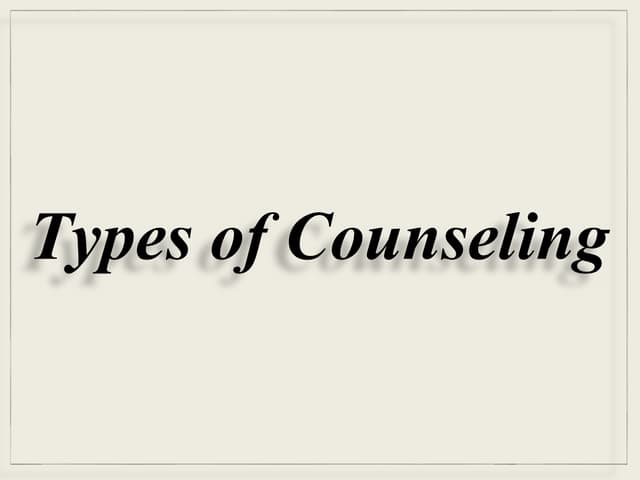couples counselling sessions: Breaking Down the Process
A Comprehensive Guide to the Numerous Kinds Of Counselling and Their Impact
Therapy encompasses a range of healing methods, each developed to fulfill unique mental health and wellness requirements. From the organized techniques of Cognitive-Behavioral Treatment to the understanding nature of Person-Centered Treatment, these modalities provide unique pathways to individual development. Family therapy and Dialectical Behavior modification supply added structures for healing, while team therapy promotes community support. Comprehending these diverse approaches can brighten their extensive effect on specific health. What remains to be explored are the ins and outs of each technique.

Understanding Cognitive-Behavioral Therapy (CBT)
Although numerous restorative approaches exist, Cognitive-Behavioral Therapy (CBT) attracts attention as a result of its organized, ambitious nature. This type of treatment is based on the premise that thoughts, feelings, and actions are interconnected, and by altering adverse thought patterns, people can alter their psychological actions and actions. CBT uses different strategies, such as cognitive restructuring, which assists clients determine and test altered beliefs. Behavioral activation motivates involvement in satisfying activities to battle anxiety.
Typically, CBT is a short-term therapy, typically long-term between 12 to 20 sessions, making it available for those seeking fast outcomes. Its performance has been well-documented in dealing with anxiety problems, depression, and other psychological health problems. The specialist's role is to lead clients with workouts and research tasks, promoting self-awareness and advertising long-lasting coping methods. This practical technique equips individuals to take control of their mental wellness, ultimately causing improved life fulfillment.
Exploring Person-Centered Therapy
Person-Centered Treatment, established by Carl Rogers, provides a different strategy to Cognitive-Behavioral Treatment by emphasizing the client's subjective experience. This therapeutic version prioritizes the person's perspective, cultivating a setting of compassion, genuine positive regard, and credibility. By permitting customers to discover their sensations and ideas without judgment, specialists help with individual development and self-discovery.
The core tenet of Person-Centered Treatment is the idea that individuals possess the integral capacity for self-healing and individual advancement. In this setting, the therapist works as a helpful overview instead of a directive authority, urging customers to organize their own trip. This technique is specifically effective for those coming to grips with problems such as reduced self-worth, stress and anxiety, or clinical depression, as it encourages them to confront and comprehend their feelings. Ultimately, Person-Centered Treatment grows a strong restorative partnership, fostering trust fund and visibility vital for purposeful change.
The Duty of Family Members Treatment in Recovery
Family members therapy works as a vital component in the recovery procedure for individuals and their relationships. This restorative technique focuses on boosting interaction, resolving conflicts, and cultivating deeper connections among family participants. By resolving dysfunctional characteristics, household therapy motivates each participant to share their ideas and feelings in a secure atmosphere, advertising understanding and compassion.

The influence of family members treatment expands beyond the sessions, as improved connections can bring about boosted emotional wellness for all involved. Generally, household treatment plays an important duty in healing by promoting unity, strength, and shared support amongst relative, inevitably assisting them toward a much healthier, much more fulfilling life with each other.
Unloading Dialectical Behavior Modification (DBT)
Building on the foundation of therapeutic strategies that improve emotional well-being, Dialectical Behavior modification (DBT) uses a structured structure for people battling with intense feelings and behavioral challenges. Created by Marsha Linehan, DBT integrates cognitive-behavioral strategies with mindfulness techniques, intending to assist clients handle overwhelming sensations and improve social effectiveness.
The therapy is particularly helpful for those diagnosed with Borderline Character Condition yet is additionally relevant to a series of various other mental health and adhd counselling wellness issues. virtual therapy. DBT contains private therapy sessions and abilities training groups, concentrating on 4 crucial ability sets: mindfulness, distress tolerance, emotion law, and interpersonal efficiency
The Benefits of Team Counselling Procedure
While specific therapy offers beneficial understandings, group therapy sessions use distinct advantages that can significantly enhance the therapeutic experience. One vital advantage is the sense of neighborhood that emerges amongst participants. Individuals often discover convenience in sharing their experiences with others encountering similar obstacles, cultivating an encouraging setting that minimizes feelings of seclusion.
Moreover, group sessions encourage varied point of views, allowing individuals to discover from each other's coping approaches and understandings. This cumulative wisdom can result in boosted analytical abilities and a more comprehensive understanding of personal problems.
Additionally, group counseling usually advertises responsibility, as members encourage one an additional to pursue their goals and stick to their dedications. Finally, the cost-effectiveness of team treatment makes it an easily accessible alternative for many people seeking assistance. Overall, the collective nature of team therapy sessions can greatly enrich the healing trip.
Regularly Asked Questions
What Certifications Do Specialists Required to Practice Therapy?
Therapists usually require an appropriate level in psychology or therapy, together with monitored clinical experience. Furthermore, they should get suitable licensure or certification to exercise lawfully, making certain adherence to professional requirements and honest guidelines.
Just how Do I Pick the Right Type of Therapy for Me?
Choosing the best sort of treatment involves assessing personal requirements, exploring various strategies, thinking about therapist specialties, and looking for referrals. Recognizing individual goals and choices can substantially boost the efficiency and contentment of the healing experience.

Are Online Therapy Procedure as Effective as In-Person Ones?
The performance of on the internet counseling sessions contrasted to in-person ones commonly depends upon private preferences and situations. Study suggests that both techniques can generate favorable results, though some may locate better comfort in face-to-face communications.
How Much Time Does Therapy Generally Last?

What Should I Expect During My Initial Therapy Session?
During the very first counseling session, customers can anticipate an introduction, discussion of their concerns, facility of objectives, and an overview of the counseling procedure - relationship therapy. This preliminary conference aims to develop relationship and assurance convenience